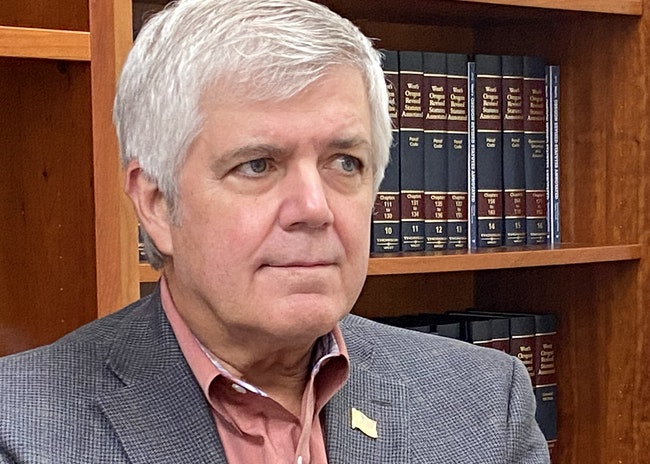
U.S. Rep. Cliff Bentz, R-Oregon. (FILE/The Enterprise)
U.S. Rep. Cliff Bentz met behind closed doors with his Republican colleagues in Washington, D.C., on Jan. 6 as President Trump implored Congress to overturn the presidential election.
They huddled to consider the case for dismissing millions of American votes. Making that case would give Trump the second term that he falsely claimed he won.
In the coming hours, Bentz, R-Oregon, would lock down in his Congressional office as marauders a block away vandalized the Capitol. Secured with his staff, he parsed legal issues on voting in six states in question.
And he ultimately joined the effort to deny one state – Pennsylvania – a say in who should be president.
The vote was consequential for Bentz, serving just his fifth day in office. He had come to Congress representing Oregon’s 2nd Congressional District, an attorney by training and an experienced politician with years in the Oregon Legislature.
In an interview Saturday with the Malheur Enterprise, Bentz explained his path to that vote. He shared how he learned belatedly about “inappropriate” remarks made by Trump as the insurrection unfolded.
He’s faced intense scrutiny for his stance. Commenters by hundreds loaded up his Congressional Facebook page. Some supported his vote against the Pennsylvania results but most criticized him. A few said he disgraced himself and should resign.
Bentz said, however, that he acted on principle, not politics, when he cast that vote.
“Sometimes it’s really difficult to do the right thing,” Bentz said.
The path, the vote
On Jan. 6, Congress convened to consider election results certified by each state, and formally declare the winner of the presidential election. The process is typically routine with little controversy.
But key Republican legislators had joined with Trump in conceiving a plan to thwart the process. They hoped Congress would reject the results from enough states to strip away their electoral votes for Joe Biden, leaving Trump the winner.
Bentz had already signaled his concerns about the election, joining with 25 other Congressmen-elect in a Dec. 15 letter to House Speaker Nancy Pelosi. The letter asked for an investigation.
DOCUMENT: Letter seeking Congressional investigation
The incoming legislators referred to “multiple states engaged in litigation” and said that “thousands of witnesses have submitted sworn affidavits of reported fraud.”
The letter also said the legislators had “verified reports” of issues with mail ballots, with voting machines and with restrictions on election observers.
During the Enterprise interview, Bentz conceded he saw no evidence of those issues.
“That part of the letter I don’t support,” he said.
He also said that he didn’t accept the president’s claims that election fraud was so widespread that he actually won.
Against the backdrop of such fraud claims, Republican congressmen met at 9 a.m. Jan. 6 in an auditorium at the Capitol Visitor Center. According to Bentz, objections to the results of six states were anticipated. Congressmen stated the case for and against the objections for each state.
The session broke up three hours later, each Congressman left to decide on their own how to treat each state’s electors. Bentz said he was not pressured by House Minority Leader Kevin McCarthy, R-California, or other Republicans to support overturning the presidential election.
As they left the auditorium, Trump was launching into an outdoor speech not far away, addressing thousands of his supporters. His speech later was blamed by officials in both political parties for inciting the invasion of the Capitol.
Unaware of the president’s rallying speech, Bentz returned to his second-floor suite of offices in the Longworth House Office Building, across Independence Avenue from the Capitol.
There, his staff went to work to analyze the election processes in the six contested states.
“I told them to go through each state as best we can” to determine “what foundation for a constitutional objection” existed, he said.
He wanted to know if the election process in any state seemed out of line with the Constitution.
“That work was very difficult,” Bentz said.
He said he decided he would object to a state’s election results if the vote was done using methods not authorized by that state’s legislature. He said the Constitution delegates to state legislators, not other government officials, the power to decide how elections will be done.
Bentz concluded that the challenge to Arizona wasn’t justified, and late Wednesday night – after the invaders had been expelled and order restored – he joined others in the House in voting against that objection.
The deliberations continued on into the early morning hours of Jan. 7.
The Pennsylvania vote
About 12:30 a.m. Washington time, the House turned to Pennsylvania. The debate lasted two hours, but Bentz didn’t speak or make any submission to the Congressional Record to explain his eventual vote supporting the objection.
Bentz, in the later interview, said he had concluded that Pennsylvania’s votes should be rejected, based on how the state handled certain mail ballots. Trump for months had told the country that mail ballots were rife with fraud.
Pennsylvania officials intended to count any mail ballots that were postmarked by Election Day but delivered in the next few days, extending the deadline. Their decision was backed by the Pennsylvania Supreme Court.
The state received 9,428 such ballots, but set them aside at the direction of the U.S. Supreme Court. So the results of those votes weren’t included in the state’s final count sent to Congress, showing Biden had won the state by about 80,000 votes.
The Republican Party of Pennsylvania said in a Dec. 16 court filing that it was content to let the Supreme Court settle the matter.
“This case is an ideal vehicle, in part precisely because it will not affect the outcome of this election,” the filing said.
Bentz said in the interview that he wasn’t aware the votes hadn’t been included in Pennsylvania’s totals. He acknowledged that had he been successful in his challenge, his questioning of about 10,000 uncounted ballots would have overturned the results of voting by nearly 7 million people.
But he also explained that he acted on principle – that he judged that Pennsylvania had violated the U.S. Constitution and he wasn’t going to support that.
His intent, he said “was to follow the Constitution.”
At 3:08 a.m. Washington time on Thursday, the House considered and rejected the objection to Pennsylvania’s election results. Bentz joined 137 Republican representatives in the failed effort to overturn those results.
“It would have been easy to have voted against the objection for Pennsylvania,” Bentz said. “That’s not what my analysis showed. You’ve got to stick with your principles.”
Bentz said he was also mindful that voters across the country still doubt the election results.
“I wanted people to understand they were being heard,” Bentz said. “These people are so angry about being left out.”
Contact editor Les Zaitz by email at [email protected].
RELATED COVERAGE:
Bentz opposes impeachment but expects Trump to be held ‘accountable’
SUPPORT OUR VITAL LOCAL WORK: We provide Malheur County the local journalism that searches out the facts for you. SUBSCRIBE FOR $5/month. Click HERE.




